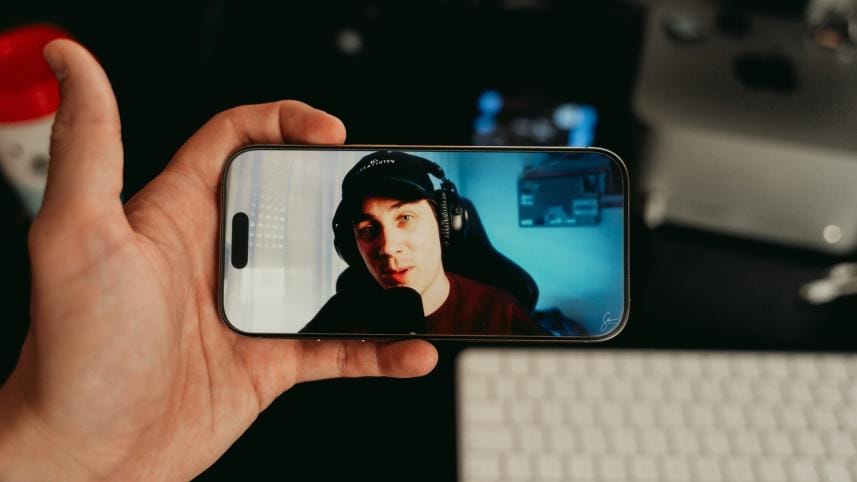China just changed the rules for influencers — the world’s watching

We've all been there, glued to the palm-sized black mirror you call a smartphone. Looking for that magical genie, in the form of a content creator, who's going to have answers to all your woes. Want to make it big in a year? There's Mr FinX with that "tried-and-proven" method to become a millionaire (just buy his course). Want to get fit and six-pack abs? That Instagram guy has home workouts you can follow and get great results. In reality, a lot of the creators above are just repackaging old ideas, ideas you could've Googled, with an expensive camera and a glossy thumbnail.
So, the headline from China has had everyone working in the content space on alert and talking globally: the Cyberspace Administration of China (CAC) has rolled out rules requiring influencers who discuss "professional or serious topics" such as medicine, law, education, or finance to hold formal qualifications (university degrees, licences, professional certificates) before posting. Platforms are being made responsible for verifying credentials and for ensuring creators declare when content is based on studies or is AI-generated.
Why this initiative is needed
For one, misinformation is at all-time high. Bad advice on health, bad financial tips, or legal opinions posted by someone with no training can lead to real harm. China argues this is about protecting public welfare and raising the credibility of online content.
For creators and consumers alike, this is also a signal that the "wild west" of online advice is being tamed. Over time, favourite creators may no longer be free to speak on everything just because they have a large following. The standard is shifting: influence without expertise may no longer pass unchallenged.

What the future looks like for content creators
For creators in markets like Bangladesh, even if you're not immediately under similar regulation, the ripple effects are real. Brands, platforms and audiences may begin insisting on higher standards. A creator who gives financial advice or health tips might need to prove credentials, or team up with someone who has them. That means the skill set changes: you're not just charismatic, you're legitimately informed (or you publicly note your limitations).
This means vetting creators more deeply: their background, their claims, their liability. Campaigns that lean on "expert advice" will demand certifications as part of the brief. The barrier to entry will rise for some niches and will reward creators who invest in training, certification, or align with professionals.
For creators who specialise in "softer" content like lifestyle, entertainment, travel, casual advice, the rules might be less immediate. But the trend signals that audiences are increasingly sceptical: "Does your favourite creator actually know what they're talking about?" When a creator makes bold claims ("lose 20 kg in 2 weeks", "invest and triple your money"), expect more questions. In Bangladesh, where regulation in this space is weaker but user vulnerability is high, that's overdue.

But is such gate-keeping necessary in Bangladesh? And what about the risk of censorship?
Yes, in a country like Bangladesh, there's a strong case for applying some version of this. Many people believe anything their favourite creator says but rarely check credentials or expertise. When financial gurus proliferate, health advice goes unchecked, "study abroad" testimonials flood social media without oversight, this environment is ripe for misinformation. Gate-keeping helps protect the public.
On the flip side, gate-keeping is a double-edged sword. One wonders: is this measure purely about "quality of advice", or is it also about "control of discourse"? The Chinese law opens that discussion. Critics say it's a precursor to broader censorship: limiting who can speak, about what, and when.
In Bangladesh's context, any move to regulate must balance two pillars: protect the public from harmful advice, and preserve creative freedom and diversity of voices. Over-regulation risks silencing legitimate but unconventional voices who don't have formal degrees yet know their craft (think community activists, self-taught professionals, lived-experience creators). The question becomes: who defines "valid credential"? China's rule is vague: is any bachelor's degree enough? Or must it be field-specific licence/certification?
Also, how will verification work in practice? Platforms must check credentials, declare sources, and label AI-generated content, but the details remain unclear. If Bangladesh ever follows suit, the regulatory design needs to be transparent and fair.
This development from China should serve as a wake-up call for content creators, strategists, brands and audiences alike, even if you're operating from Dhaka. The era of "influence = expertise" is being challenged. As you build your creator strategy or advise brands, think of three things: credentials, transparency, responsibility.
For Bangladesh, yes, some gate-keeping is long overdue. But it must be done with care, not as a blunt instrument of control, but as a tool of credibility. Because at the end of the day: followers don't just want entertaining voices, they want trustworthy ones.




 For all latest news, follow The Daily Star's Google News channel.
For all latest news, follow The Daily Star's Google News channel.
Comments